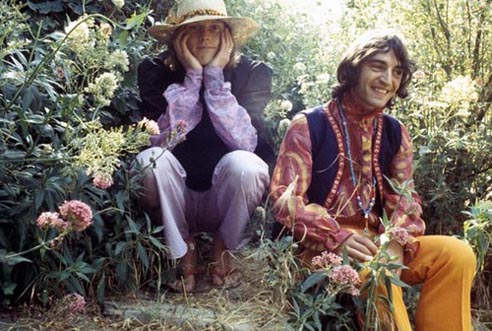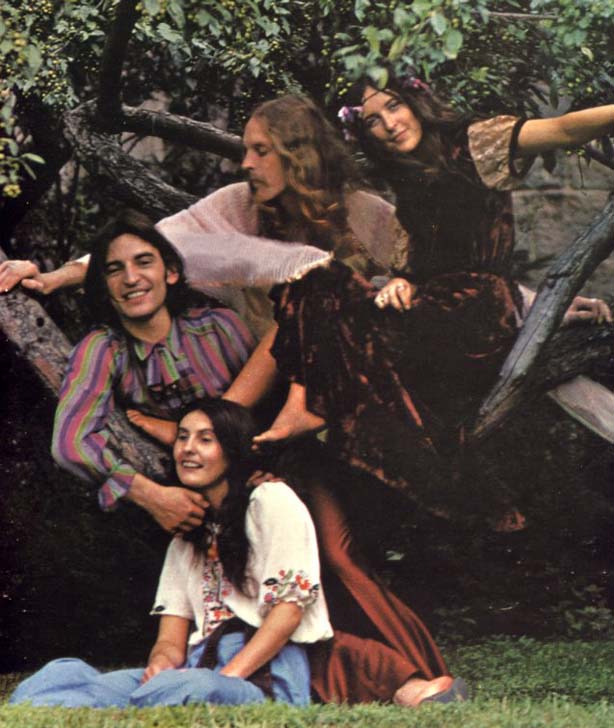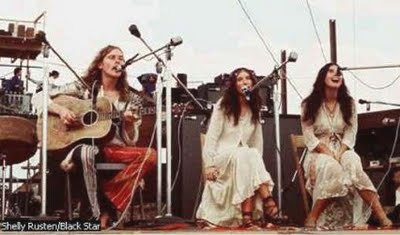The Incredible String Band
Psychedelic folk band formed in Scotland in 1965, the band built a
considerable following, especially within British counter-culture before
splitting up in 1974. The members of the group are considered musical pioneers
in psych folk and, by integrating a very wide variety of
traditional music forms and instruments, in the development of world
music. The group reformed in 1999 and continued to perform until 2006.
In 1963, acoustic musicians Robin Williamson
and Clive Palmer began performing together as a traditional folk duo in
Edinburgh, particularly at a weekly club run by Archie Fisher in the Crown Bar
which also regularly featured Bert Jansch. There they were seen in
August 1965 by Joe Boyd, then working as a talent scout for the influential
folk-based label Elektra Records. Later in the year, the duo
decided to fill out their sound by adding a third member, initially to play
rhythm guitar. After an audition, local rock musician Mike Heron won the
slot. The trio took the name The Incredible String Band. Early in 1966
Palmer began running an all-night folk club, Clive's Incredible Folk Club,
on the fourth floor of a building in Sauchiehall Street in Glasgow, where they
became the house band. When Boyd returned in his new role as head of Elektra's
London office, he signed them up for an album, beating off a rival bid from Transatlantic
Records.
 They recorded their first album, titled The Incredible String Band, at the Sound Techniques
studio in London in May 1966. It was released in Britain and the United States
and consisted mostly of self-penned material in solo, duo and trio formats,
showcasing their playing on a variety of instruments. It won the title of Folk
Album of the Year in Melody Maker's annual poll, and in a 1968 Sing Out!
magazine interview Bob Dylan praised the album's October
Song as one of his favourite songs of that period.
They recorded their first album, titled The Incredible String Band, at the Sound Techniques
studio in London in May 1966. It was released in Britain and the United States
and consisted mostly of self-penned material in solo, duo and trio formats,
showcasing their playing on a variety of instruments. It won the title of Folk
Album of the Year in Melody Maker's annual poll, and in a 1968 Sing Out!
magazine interview Bob Dylan praised the album's October
Song as one of his favourite songs of that period.
The trio broke up after recording the album. Palmer
left via the hippie trail for Afghanistan and India, and Williamson and his
girlfriend Licorice McKechnie went to Morocco with no firm plans to return.
Heron stayed in Edinburgh, playing with a band called Rock Bottom and the
Deadbeats. However, when Williamson returned after running out of money,
laden with Moroccan instruments including a gimbri which was much later eaten
by rats, he and Mike reformed the band as a duo.
Innovation and
success as a duo, 1966-68
In November 1966 Mike Heron and Robin
Williamson embarked on a short UK tour, supporting Tom Paxton and Judy
Collins. In early 1967, they performed regularly at London clubs, including
Les Cousins. Joe Boyd became the group's manager as well as producer,
and secured a place for them at the Newport Folk Festival, on a bill
with Joni Mitchell and Leonard Cohen.
The duo were always credited as separate writers,
maintaining their individual creative identities, rather than working as a
writing partnership. Boyd wrote:- "Mike and Robin were Clive's friends
rather than each other's. Without him as a buffer, they developed a robust
dislike for one another. Fortunately, the quality and quantity of their
songwriting was roughly equal. Neither would agree to the inclusion of a new
song by the other unless he could impose himself on it by arranging the
instruments and working out all the harmonies."
In July, they released their second album, The 5000 Spirits or the Layers of the Onion,
accompanied by Pentangle's Danny Thompson on double bass and Licorice
on vocals and percussion. The album demonstrated considerable musical
development and a more unified Incredible String Band sound.
It displayed their abilities as multi-instrumentalists
and singer-songwriters, and gained them much wider acclaim. The album included
Heron's The Hedgehog's Song, Williamson's First Girl I Loved (later recorded by Judy Collins,
Jackson Browne and Don Partridge) and his The Mad Hatter's Song, which, with its mixture of musical styles,
paved the way for the band's more extended forays into psychedeliq.
Enthusiastic reviews in the music press were accompanied by appearances at
venues such as London's UFO Club (co-owned by Boyd), the Speakeasy Club, and
Queen Elizabeth Hall.
Their exposure on John Peel's Perfumed Garden radio
show on the pirate ship Radio London, and later on BBC's Top Gear, made them
favourites with the emerging UK underground audience. The album went to Number
One in the UK folk chart, and was named by Paul McCartney as one of his
favourite records of that year.
 1968 was the band's annus mirabilis with the release
of their two most-celebrated albums, The Hangman's
Beautiful Daughter and the double LP Wee
Tam and the Big Huge (issued as two separate albums in the US).
Hangman's reached the top 5 in the UK album charts soon after its release in
March 1968 and was nominated for a Grammy in the US. Robert Plant of Led
Zeppelin said his group found their way by playing Hangman's and following
the instructions. A departure from the band's previous albums, the set relied
heavily on a more layered production, with imaginative use of the then new
multi-track recording techniques.
1968 was the band's annus mirabilis with the release
of their two most-celebrated albums, The Hangman's
Beautiful Daughter and the double LP Wee
Tam and the Big Huge (issued as two separate albums in the US).
Hangman's reached the top 5 in the UK album charts soon after its release in
March 1968 and was nominated for a Grammy in the US. Robert Plant of Led
Zeppelin said his group found their way by playing Hangman's and following
the instructions. A departure from the band's previous albums, the set relied
heavily on a more layered production, with imaginative use of the then new
multi-track recording techniques.
The album featured a series of vividly dreamlike
Williamson songs, such as The Minotaur's Song,
a surreal music-hall parody told from the point of view of the mythical beast,
and its centrepiece was Heron's A Very Cellular Song,
a 13-minute reflection on life, love and amoebas; its complex structure
incorporated a Bahamian spiritual (I Bid You Goodnight)
and an adaptation of a Sikh hymn (by may the pure
light within you). Williamson and Heron in this album had added their
girlfriends, Licorice McKechnie and Rose Simpson to the band to
contribute additional vocals and a variety of instruments, including organ,
guitar and percussion. Despite their initially rudimentary skills, Simpson swiftly
became a proficient bass guitarist, and some of McKechnie's songs were recorded
by the band.
By early 1968 the group were capable of filling major
venues in the UK. They left behind their folk club origins and embarked on a
nationwide tour incorporating a critically acclaimed appearance at the London
Royal Festival Hall. Later in the year they performed at the Royal Albert Hall,
at open-air festivals, and at prestigious rock venues such as the Fillmore
auditoriums in San Francisco and New York. After their appearance at the
Fillmore East in New York they were introduced to the practice of Scientology
by David Simons (aka "Rex Rakish", once of Jim Kweskin's Jug Band).
Joe Boyd, in his book "White Bicycles - Making Music in the 1960s"
and elsewhere, describes how he was inadvertently responsible for their
"conversion" when he introduced the band to Simons who, having become
a Scientologist, persuaded them to enrol in his absence. The band's support for
Scientology over the next few years was controversial among some fans, and
seemed to coincide with what many saw as the beginning of a decline in the
quality of their work. In an interview with Oz magazine in 1969 the band spoke
enthusiastically of their involvement with it, although the question of its effect
on their later albums has provoked much discussion ever since.
Their November 1968 album, Wee
Tam and The Big Huge, recorded before the US trip, was musically
less experimental and lush than "Hangman's" but conceptually even
more avant-garde, a full-on engagement with the themes of mythology, religion,
awareness and identity. Williamson's otherworldly songs and vision dominate the
album, though Heron's more grounded tracks are also among his very best, and
the contrast between the two perspectives gives the record its uniquely dynamic
interplay between a sensual experience of life and a quest for metaphysical
meaning. The record was released as a double album and also simultaneously as
two separate LPs - a strategy which lessened its impact on the charts. But it
is invariably the favourite album in polls among the ISB hard-core following.
Change and experiment, 1968-70
At this time most
of the group lived communally at a farmhouse near Newport in Pembrokeshire,
Wales, where they developed ideas for mixed media experiments with Malcolm Le
Maistre and other members of David Medalla's Exploding Galaxy troupe. There, a
film was made about the ISB, Be Glad For the Song Has No Ending.
Originally planned for BBC TV's arts programme Omnibus, it featured documentary
footage and a fantasy sequence, The Pirate and the Crystal Ball illustrating their attempt at an idyllic
communal lifestyle. It made little impact at the time, but reissues on video
and DVD have contributed to the recent revival of interest in the band.
 The band toured for much of 1969, in the USA and the
UK. In August they played at Woodstock later than planned, having refused to
perform in the pouring rain on the opening evening. Their slot was taken by Melanie,
whose performance inspired her song Lay Down (Candles
in the Rain). As a result, the ISB were not included in the iconic movie
documenting the festival; their performance was re-scheduled, and they did not
go down well with the crowd, used to the more hard-hitting psychedelic rock of
bands such as Canned Heat who had preceded them on the day.
The band toured for much of 1969, in the USA and the
UK. In August they played at Woodstock later than planned, having refused to
perform in the pouring rain on the opening evening. Their slot was taken by Melanie,
whose performance inspired her song Lay Down (Candles
in the Rain). As a result, the ISB were not included in the iconic movie
documenting the festival; their performance was re-scheduled, and they did not
go down well with the crowd, used to the more hard-hitting psychedelic rock of
bands such as Canned Heat who had preceded them on the day.
In November 1969
they released the album Changing Horses,
which was generally seen as a disappointment after their earlier work. By late
1969, they had established a communal base at Glen Row near Innerleithen, and
the relationships between Mike and Rose and Robin and Licorice had ended. In
April 1970 they released the album I Looked Up.
The ISB's performances were more theatrical than those of most of their contemporaries. In addition to the spectacle of their exotic instruments and colourful stage costumes, their concerts sometimes featured poems, surreal sketches and dancers, all in the homegrown, non-showbiz style characte-ristic of the hippy era. In 1970, Robin Williamson (with little input from Heron) attempted to fuse the music with his theatrical fantasies in a quixotic multi-media spectacular at London's Roundhouse called "U", which he envisaged as "a surreal parable in dance and song". It combined the band's music with dancing by the Stone Monkey troupe (which had evolved out of Exploding Galaxy), the letter U representing a transition from a high level of spiritual awareness to a low, then returning to a final peak of awareness and communication. Although ambitious, critical response was mixed, with some harsh reviews from critics who had in some cases acclaimed their earlier work. It fared little better in New York, a planned US tour of "U" having to be cancelled after a few performances at the Fillmore East. Joe Boyd described the show as "a disaster".
Diminishing returns, 1971-74
After that the
group lasted another four years, although there was a gradual decline in their
status and commerciality after 1970. Joe Boyd, whose skilful handling of the
band had contributed much to their international success, stopped managing them
and returned to the US. The group left Elektra Records and signed for Island,
for whom they recorded five albums. The first was a soundtrack to the "Be
Glad..." film, and this was followed by the eclectic Liquid Acrobat As Regards The Air, regarded as
their best album for some time.
The band continued
to tour and record. Rose Simpson left in
1971, and was replaced by Malcolm LeMaistre, formerly of the Stone Monkey
troupe. Mike Heron took time out to record a well-received solo album, Smiling Men with Bad Reputations, which, in
contrast to the ISB's self-contained productions, featured a host of session
guests, among them Pete Townshend, Ronnie Lane, Keith Moon,
John Cale and Richard Thompson. The following year, Licorice
left, and was replaced by Gerard Dott, an Edinburgh jazz musician and friend of
both Heron and Williamson who had contributed to Smiling Men... Williamson also
recorded a solo album, Myrrh, which
featured some of his most extraordinary vocal performances.
The group's
changing line-up, adding Stan Schnier (aka "Stan Lee") on
bass, Jack Ingram on drums, and Graham Forbes on electric guitar
reflected moves toward a more conventional amplified rock group. Their final
albums for Island were received disappointingly, and the label dropped them in
1974. By then, disagreements between Williamson and Heron about musical policy
had become unbearable, and they split up in October 1974.
Solo careers, 1974-1999
Williamson soon
formed Robin Williamson and His Merry Band, which toured and released
three albums of eclectic music with a Celtic emphasis. Within a few years, he
went on to a solo career, moving increasingly into traditional Celtic styles.
He also produced several recordings of humorous stories. Heron formed a rock
group, called first Mike Heron's Reputation, then just Heron, and
later released occasional solo albums.
Reunion and final separation, 1999-2006
In 1997, Williamson
and Heron got back together for two concerts, which were warmly received. This
was followed by a full reunion of the original three members plus Williamson's
wife, Bina, and Lawson Dando in 1999. However, they did not recapture the high
reputation of the original ISB, playing mostly small venues to mixed critical
and audience responses. In March 2003 it was announced that Robin and Bina
Williamson had left. Heron, Palmer and Dando, and new member Claire
"Fluff" Smith continued to tour regularly around the United Kingdom
and internationally. Heron, Dando and Palmer toured the US in 2004. Their last
concert together was at the Moseley music festival in September 2006.